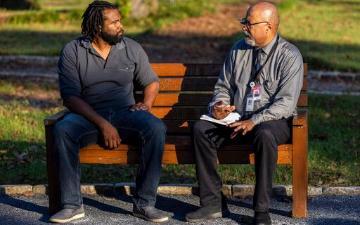Brandi Chastain, the woman to score the world-famous, game-winning penalty shot against China in the 1999 Women’s World Cup final, addressed the ethical challenges facing women in sports at a talk Oct. 17, coinciding with the exhibit at SCU’s deSaisset Museum: “Game Face: What Does a Female Athlete Look Like?” Chastain touched on many ethical issues including sportsmanship, professionalism, sexuality, pay scale, work-life balance, and weight and body image.
Chastain began with the history behind the Olympic games, pointing out that since the games started in 14 B.C., they have had the same focus: balance between mind, body, and spirit. As she went on to describe her personal journey towards Olympic gold, she remembered, “I began playing sports purely for what the philosophy of Olympics stated, which was, balancing all the qualities of mind, body, and spirit, competition, raising our own standard, finding new and creative ways to reach that next level, but all the while keeping sportsmanship as the primary focus… I played sports for sport's sake and I never remember having or hearing all those issues that we are facing in today’s sports world.”
Today sportsmen and sportswomen have fights on the field, reporters are interested in the sexuality of the players, and religion has become an area of discussion. Universities and the NCAA give special privileges to athletes beyond those of a normal citizen.
Chastain also compared the experiences of men and women in professional athletics. She commented that the only sport where players are rewarded on an equal footing is tennis, which she said should become the benchmark. When Chastain played in the short-lived Women’s United Soccer Association, the salaries the athletes accepted were quite low, in an effort to help the league survive. She added, “I have never seen this in professional men’s sports…. We were asked to give up money for the greater good.”
Parenting while being a sportsperson is another issue that has probably never been discussed in a professional men’s locker room, but which Chastain said faces many women athletes. She told the audience an inspiring anecdote about fellow National soccer team member Joy Fawcett, at the time when she was coaching soccer at UCLA: “She would be coaching her game, and at half time, the assistant coach would do the talk, and [Fawcett] would run to the locker room to feed the baby… and she didn’t think twice about that. That was just what she needed to do… Joy saw that as she being the best mother that she could be.”
Chastain is addressing the issues facing girls and women in athletics through the non-profit organization, Bay Area Women's Sports Initiative (BAWSI), founded in 2005 with fellow soccer Olympian Julie Foudy and Marlene Bjornsrud, former general manager of the San Jose CyberRays women's professional soccer team.
Chastain ended the talk with these words: “This is my soul, my passion, and what I do everyday. I can’t get enough of what … I do, going out to the playground every week to get young girls who have never participated on a team before and have no idea of the concept of team or wearing a jersey or belonging to a group” excited about sports. The girls learn, Chastain said, “how belonging to the team can empower them and get them [to be] healthy and take charge of their own lives.”
Chastain is a native of San Jose, California and an SCU alumna. She is married to Jerry Smith, the head coach of Santa Clara University’s soccer program, and has two children. She first represented her country on April 18, 1991, against Mexico. Her talk was sponsored by the Markkula Center for Applied Ethics at Santa Clara University.



